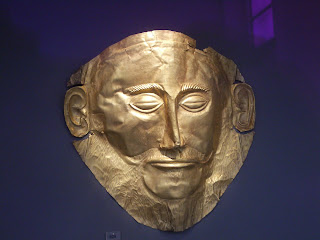I’m enjoying Michael
Crighton’s “Andromeda Strain.” One thing I’
ve noticed is that
Crighton walks a good balance between telling me the outcome versus keeping me in the dark. Somewhere along these lines is how an author builds suspense and makes a story into a page-turning thriller.
Crighton gives me just enough to bait me on into the next section, but I never quite know enough to know what happens at the end. He hints of a catastrophic ending, but I don’t know what that ending will be. I keep reading to see how it will unfold.
As I work on my next story (it’s a secret – for now), I am trying to take a quasi-familiar Greek tale and make it a compelling read. It seems that the less I give in the opening, the more of a draw it will be for sucking my reader into the story.
On the other hand, Alfred Hitchcock, the acknowledged master of suspense believed in the ‘
bomb theory.’ Nobody would think three men sitting around the table talking baseball could fill an entire scene (or, chapter) in a suspenseful manner, right? Certainly the conversation
isn’t intriguing. Unless, Hitchcock first introduces to the audience that a ticking time bomb under that very table will explode in five minutes. Now, we practically yell for the men around the table to run. How could they be calmly sitting there playing cards??? Suspense.
Hitchcock’s technique is to tell you what is about to happen (or could happen) and then you let you fear and sweat out that imminent
occurrence. Although he told me something catastrophic will occur. Michael
Crighton, in “Andromeda Strain,” seems to be keeping everything about it rather vague. Incidentally, James Rollins perfectly executes this technique in his thriller, “Black Order.”
What a decision -- how many details do I give the reader upfront? This could be looked at different ways, but simply by placing a book in a certain genre, authors practice this to some degree. If I buy a horror book, I anticipate something bad and scary to happen. The more I think on it, the more degrees of this that I see. Back to Rollins -- I buy one of his books, and I know that Sigma Force and Commander Pierce will win in the end. Yet, I’m incredibly drawn to find out how they’ll do it.
It makes me realize that all sorts of subtle ways exist to set up the mystique of my story and to entice the reader to want to plunge into my book. I’ll likely make use of both techniques. At some points, I’ll be particularly vague but in other instances, the audience is going to know, and because they know, they are going to be in suspense. I’
ve heard it said that the less you can give, the better your story will be. Prolong offering those details until the last possible moment they can be revealed. Easier said than done, right?
Can you think of some good examples of stories that made use of withholding information to create suspense? What about some that gave information to create suspense?







